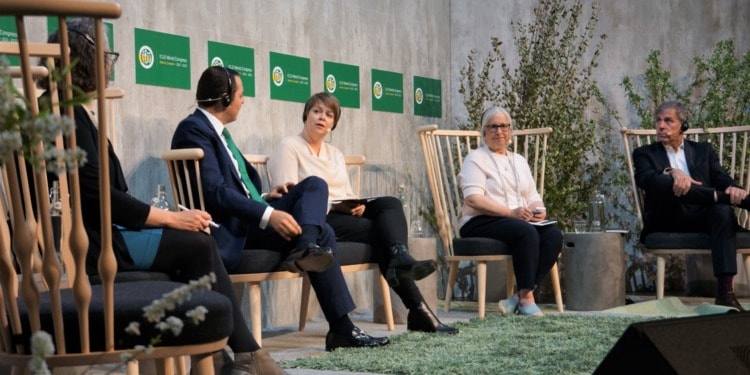The ICLEI World Congress 2021 – 2022, hosted by ICLEI – Local Governments for Sustainability (ICLEI), and the City of Malmö, Sweden, was held on May 11-13 with the Malmö Summit – an international three-day congress for local and regional governments, urban practitioners, researchers and stakeholders to exchange with and inspire one another on the best practices in local sustainable development.
ICLEI, a global network of more than 2500 local and regional governments committed to sustainable urban development and active in over 125 countries, holds its World Congress every three years to showcase how local and regional governments are advancing sustainable urban development worldwide.
Highlights of the three-day event
At Impakter, we have been closely following the live broadcasted sessions of the Summit, and here are the main highlights of the event.
Wednesday, May 11: The strategies and tools that best address climate issues
Following the opening plenary, the Malmö Summit kicked off with a first session focused on the current stage of the world in regard to sustainable development, and the importance of global cooperation at all levels to equitably drive sustainably forward.
In a session showcasing smart scalable solutions for sustainable urban development, Anette Blücher, Director Energy Infrastructure Solutions Nordic, E.ON, Sweden, presented the E.ON ectogrid™: a scalable and energy-efficient solution that can produce all necessary heating and cooling in one system, enabling cities to achieve zero-emission levels. Next, a Community Director, ClimateView Sweden, Orren Shalit debated how to make climate action plans, highlighting the importance of identifying greenwashing and strategies to turn the financial sector green. “Due to the absence of clear guidelines, we need to create a common language, creating a map, and a compass, in order to collectively work on climate action,” he said.
A Business Development Director at MKB, Sweden, Jonas Stark discussed sustainable solutions from the housing sector, such as planting trees all over the town of Malmö and investing in mobility solutions like biking as well as developing the skills of the younger generation in order to cooperatively work on a greener future.
A Nature Conservation Expert from the County Administrative Board of Skåne, Sweden, Johan Niss, discussed how to select the best nature conservation measures on the basis of science-based biodiversity assessments, and the concrete set of actions to be taken on local- and regional levels to restore and conserve biodiversity and enhance ecosystem services.
Anna Williams, working for Google, introduced the Environmental Insights Explorer (EIE) that uses exclusive data sources and modelling capabilities in a freely available platform: This will help cities and regions to measure emission sources, run analyses, and identify strategies to reduce emissions — creating a foundation for effective climate action through Google. To date, there are 40.000 cities and communities using the EIE. “70% of the world’s CO2 emissions are coming from cities: many lack the solutions for becoming more sustainable,” said Anna Williams.
And, lastly, Magash Naidoo, Head of Circular Development, ICLEI World Secretariat discuss the digital tools to get started with circularity and help regenerate ecosystems.
This attracted a lot of attention as the concept of circular development, a systemic approach to redesigning the economic system to minimize the extraction of natural resources, has been gaining a lot of traction in the last few years for its potential to tackle global challenges like the climate crisis, biodiversity loss, and waste.
"This is the strength of #ICLEI, that we are a network of 2500 cities, towns and communities working on sustainability and continuously sharing knowledge" – @malmostad Mayor Katrin Stjernfeldt Jammeh, opening the first day of #ICLEICongress, which exceeded our expectations! pic.twitter.com/s5bLGksSCF
— ICLEI (@ICLEI) May 11, 2022
Thursday, May 12: The problem with car use
One of the highlights of Thursday’s session was the emphasis on tackling the car over-use in cities. There are currently many initiatives led by the European Union to tackle the over-use of cars.
However, initiatives led by local city governments are most important if change is to be made on the national level: more than 75% of the urban innovations that have successfully reduced car use were led by local city governments. The evidence from research is clear: to improve health outcomes, meet climate targets and create more liveable cities, reducing car use should be an urgent priority.
“We live in a world where nature moves away from cities, and cities move away from nature, and we are paying the price of this alienation. Cities break away from the ecosystems they’re part of, and they produce pollution and disasters instead. As local governments, we can drive the change, we have an outstanding potential to create action using our power. Nature is deeply connected within our lives,” said Tunç Soyer, Mayor, Izmir Metropolitan Municipality, Turkey, an ICLEI Global Executive Committee Member.
Friday, May 13: Leave no one behind in the fight against climate change
The last day of the Summit has a broad focus on how to collectively take action, drive global transformation and achieve sustainable development for all.
One of the highlights was the emphasis on meaningful inclusion: involving young people in cities, towns and communities. The concept of “youth washing” was mentioned by Juliet Oluoch Aluoch, Deputy National Coordinator of the African Youths Initiative on Climate Change – Kenyan chapter, which means that the voices of the young generation are being used in a performative way, while their actual actions are not put into consideration: “Let us, young people, be part of the decision-making process.”
In addition, Friday’s session focused on the need for financing climate action initiatives. Matthew Baldwin, EU Cities Mission, Mission Manager, Deputy Director-General of DG MOVE, European Commission, strongly made the point: “We must figure out the financing of implementing climate action plans among cities, otherwise those plans are just a mere dream.”
The initiative of Making Cities Resilient In 2030 (MCR2030) touches upon this issue, discussed by Mami Mizutori, Special Representative of the Secretary-General for Disaster Risk Reduction and Head of UNDRR. The initiative supports cities to make a plan for resilience and helps cities in order to finance it. More than 1000 cities are currently part of the initiative. MCR2030 strives to ensure cities are becoming resilient and sustainable by 2030.
The Summit concluded with Frank Cownie, President of ICLEI telling the audience:
“More than 500 of our members have agreed we are currently in a climate emergency. The clear message is that we need to take responsibility urgently, and choose the right path, even if that path is difficult and complex. The choices we make now, will determine our future. We, at ICLEI, have known what is happening for a long time, and now the rest of the world starts recognizing the climate crisis too.”
Editor’s Note: The opinions expressed here by Impakter.com columnists are their own, not those of Impakter.com — In the Featured Photo: A panel of Mayors and subnational leaders explain how their cities have been putting people at the heart of local sustainable development in order to combat climate change. Featured Photo Credit: ICLEI via Twitter.














